Royal Navy specialists joined forces with Japanese counterparts in Tokyo to fend off cyber-attacks during a large-scale cyber battle exercise.
According to a news release, forty-one teams from 17 nations tested their cyber defence skills during the British Army’s Defence Cyber Marvel 3 exercise in Estonia, but with an international network plugging in from across three continents.
“The Royal Navy’s cyber operations specialists based in Portsmouth are usually on the front line across the world, protecting ships and bases from threats around the clock, but were deployed to Tokyo for this valuable exercise.
They worked closely with Ukrainian teams in 2023 while in Tallinn, but this year – for the first time – formed a joint team with the Japanese Maritime Self Defence Force’s Communication Security Group. The 22-strong team – 12 RN and 10 JMSDF – were tasked with protecting an island in the Indo-Pacific facing aggressive cyber-attacks from a ‘hostile’ nation state.
The cyber battle – which increased in its complexity throughout – helped forge closer bonds and understanding between Japanese and British personnel as they prepare to work with each other next year as the UK deploys its Carrier Strike Group to the region. These skills are highly valuable given the ever-evolving attacks by hackers seen across the globe on a daily basis.”
The team battled attacks on national infrastructure amid an ongoing insurgency in this mock island state.



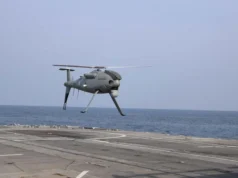
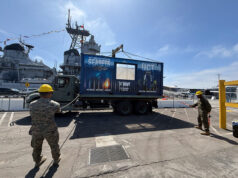
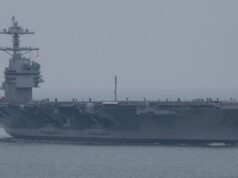
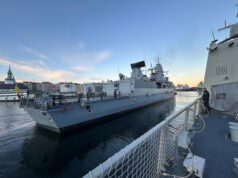
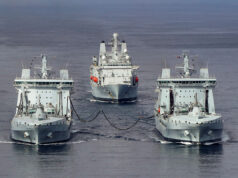



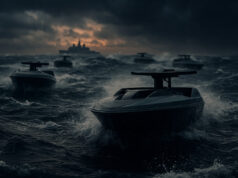
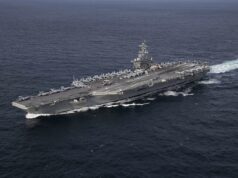

Good to see us engaging more with Japan, the UK and Japan have a lot of similarities. Unlike our other major “allies” Japan bent over backwards to get us rapidly into to CTPP.
Hopefully we go further with them on weapons development beyond Tempest.
We just have to remember not to dump them again.
They get a bit irked.
The end of the Anglo Japanese alliance was the main thing that the US wanted in the Washington naval treaty. Realistically given Japans genocidal military governments of the 1930’s it would not have lasted.
Japan willingly gave up the alliance also for the third largest tonnage in the world.
Not as far as they were concerned.
They thought that we reneged on an agreement.
Otherwise, I agree with you.
Had beer so forgive me, we had a 1930’s agreement with a country that believed their emperor was a deity or divine and we let them down.
I rarely open a bottle of port before 1800hrs, I will catch up
We did not renege in the agreement, it lapsed and we did not resign ( it was due to lapse in 1922)..in the end the UK did not resign as it felt:
1) Canada was completely against resigning due to the potential conflict and issues with the U.S.
2) there had been increased tensions between the UK and Japan around japans actions in china.
3) Japan was not happy with the UKs actions in India…
there was increased tensions between to the two powers..that essentially made them no longer compatible as allies.
It is an open question of debate as to whether the lapsing of the treaty was causal and lead to Japan entering and attacking the british empire in WW2 when it attacked the US or if the lapse in treaty was simply a symptom of in inevitable breakdown and conflict.
Meanwhile!
Secretary of the Navy Del Toro Meets with Leaders of HD Hyundai and Hanwha in the Republic of Korea, Tours Shipyards28 February 2024
“Secretary of the Navy Carlos Del Toro met with top shipbuilding industry executives in the Republic of Korea (ROK) and toured some of the world’s most technologically advanced and prolific shipyards.
Discussions were very productive and centred on attracting Korean investment in integrated commercial and naval shipbuilding facilities in the United States.
Shortly after arriving in Seoul on Sunday, February 25, Secretary Del Toro engaged separately with Hanwha Vice Chairman and CEO Dong Kwan Kim and HD Hyundai Vice Chairman and CEO Kisun Chung. The morning of Tuesday, February 27, Mr. Chung personally gave Secretary Del Toro a tour of Hyundai’s shipyard in Ulsan.
Later that afternoon, the Secretary travelled to Geoje Island, where Hanwha Ocean CEO Hyek-woong Kwon led a tour of his company’s shipyard there.
As part of his call for a new Maritime Statecraft in his speech to the Harvard Kennedy School on September 26, 2023, Secretary Del Toro had observed that the U.S. maritime industry “is ripe with opportunity to partner with a greater number of shipbuilders here in the U.S. and with our closest allies overseas, including Japan and South Korea.”
In the same speech, he announced his objective to “attract the most advanced shipbuilders in the world to open U.S.-owned subsidiaries and invest in commercial shipyards here in the U.S., modernizing and expanding our shipbuilding industrial capacity and creating a healthier, more competitive shipbuilding workforce.”
https://
navy.mil/Press-Office/Press-Releases/display-pressreleases/Article/3690336/secretary-of-the-navy-del-toro-meets-with-leaders-of-hd-hyundai-and-hanwha-in-t/
Something needs to happen with the US ship building industry its…. In a profoundly bad place, sort of like the Uk industry really…just hanging by a thread…..I’m not sure how the west can really combat the Chinese ship building industry….even Korea is struggling and they are very good at ship building. As of last year china was building over half the worlds ship tonnage ( and its increasing by around 12-15% every year) and is now producing 38million tonnes of shipping a year ( US capacity it 100,000 tonnes a year)..a coupe of years ago china was at 23 million tonnes or 230 times larger than the U.S. ship building capacity.
It’s also blending its civilian and military ship building capacity in a worrying way…some people in the pentagon are getting very very worried about the U.S. ability to keep ahead.
Cyber is going to be one of the major domains of any future war and infact will effectively be a 21c version of strategic bombing of civilian infrastructure as its one ways a nation can hit another nation across the globe…effectively the UK and and China can attack each others homelands with countervalue cyber when they would otherwise be unable to use kinetic force against each others homelands ( other than strategic nuclear exchange..or limited missile strikes from SSNs and other navel assets have transited for a month ).
But the Ukraine war has given the west some heartening news…it’s seems that countervalue cyber designed to sap and destroy the will of a nation’s population to fight has worked as well as countervalue strategic bombing did in past wars…as in it seems to harden the will to fight…and that countervalue cyber is not decisive…yes it causes suffering and it means you can destroy or impact infrastructure without using the expense of kinetic capacities…but is as none effective as bombing cities to destroy a nations will to fight.
“Russia’s Countervalue Cyber Approach: Utility or Futility?, Gavin Wilde feb 2024” is a good read on cyber learning from the Ukraine war and can really be extrapolated into the likely next war with china…as a key domain in which china will use to try and win the next war is the political domain and the use of countervalue to sap the will of western nations…so countervalue cyber will likely be a defining battleground of the next world war.
“future war”, it is probably happening now.
The beauty of it being that it does not necessarily be seen to come from its originator.
Yes it is happening now but..not really on a level you would see in wartime…shutting down someone’s power grids in an overt attack is tantamount to war and will probably only be seen as part of preparations for war or during an actual war…
They can/do use “non-state actors”.
Not quite as obvious as Wagner, but not far off.
Even if they only do recce for the real thing.
Russians cyber warfare skills were always very pedestrian, things like denial of service attacks teenage kids stuff.
Rember when there was serious talk of the UK switching off the lights in Moscow. I don’t doubt we have some very serious offensive capability like this.
Problem is as with stuxnet once you use it it’s in the world and it can be used against you or easily combated by anti virus.
If used in conjunction with kinetic effects it can be devastating.
We have some very smart people at the likes of GCHQ working in conjunction with the NSA and we spent billions in this over the years.
I’m sure we have something beyond what the rapists could do to a poor country like Ukraine.
My words exactly. The UKIC defend this country just as the military do. Their contribution is constantly ignored when people only see Tanks.
In many ways the UK and Japan are natural allies. Both are Island nations, both have populations that are to large for the country to feed them, both have potential enemies that could cut them off and both depend on the sea for their survivability. Although the UK has one advantage geographic location.
I do wonder if there should be a formal defence alliance such as a Pacific NATO that would include Japan, Canada, US, Aus, NZ, UK and France with some other nations joining a few years later.
Yes I know, why, what are we doing there, money etc. However, there will come a point where either a nation puts up or shuts up. Defence could be seen in many ways like a car insurance. You can have full comp or third party, one is more expensive than the other however with one you have no worries as you are prepared for everything the other means you are legally covered but still might not have a car because you can’t afford the repairs.
It is my opinion that Defence should no longer be at the whim of five year programs dependent on which political party is in power at the time but fixed into law what is needed. An example of what I mean is as follows. The Royal Navy should have no less that 25 surface fleet combat ships (DDGs/FFGs) no older than 25 years old. With a further useful five year life in the reserve fleet manned by RNR personnel and men/women taken on secondment (x weeks per year) from UK registered ships. Or the British army is to have a front line combat strength of no less than say 1 Armoured Div, 2 Boxer Divs, and 1 Rapid Reaction Div made up of a Ranger Brigade, Gurkha Brigade, Airborne Brigade and Sea Assault Brigade. The equipment should not be older than 20 years.
By making defence requirements law it law industry will know what to expect thereby they can tool up, train manpower keep the workforce and reduce cost by becoming more efficient.Which would be a win for the defence budget.
Yes it would mean a defence budget of 3% possibly 4% which after all is what the UK budget was for defence in the Cold War. There the UK had one main threat, now there are two major threats and several smaller ones. As much as I hate the situation but as I see it the world is much more dangerous now than it was when I served 40+ years ago.
The Japanese only require land forces for home defence.
We deploy on a different scale – that of the politico whim.
They have home defence and then some. The Japanese have increased their defence forces considerably in personnel and equipment. Their ‘Helicopter destroyers’ can accommodate F-35s onboard, turning them into light carriers.
You cannot fix a bayonet to a F35.
By that argument every country in the world only needs land forces for home defence. Off that that isn’t the case isn’t it?
They do not have an expeditionary role for their army. Limited in size and function compared to their navy.
The UK could not be that way.
Different situation.
Instead of having a Pacific NATO just add in Australia and Japan to NATO. I’m all for us being involved in the pacific as long as the US and other pacific powers are involved in Europe.
If The Republican’s do follow through and pull out of NATO then we need to re focus on Euro Atlantic.
Japan has a decent size military force and it’s getting better but it’s a home defence force much like Finland. On their own they can’t offer Europe much.
In a US NATO withdrawal it is even possible Europe will make overtures to China.
Not a world I want but a US withdrawn from NATO will be the biggest strategic change since 1941 and would change international Geo politics in a number of ways.
I doubt the US would pull out of NATO. I think its more to get certain European countries to take responsibility and pay at least the 2% on defence. Lots of European countries (plus Canada) have been taking the mickey for far too long and they have been asked many times to invest more.
The US is not a person, its does not make decisions as a person. The Republican nominee who is in a polling lead is openly stating he will A) Not Honour Article 5 and B) wants to pull out of NATO. At the same time the entire body of elected Republican representatives are holding back aid to Ukraine.
The writing is on the wall we would do well to listen.
It’s interesting because I actually think the biggest threat facing any western nation is in the pacific….where the U.S. is facing off against the second most powerful nation in the world….you would think it would want its allies well bound to it for when that shit show kicks off..although it would not surprise me if the U.S. pulls its support for tiawan if trump gets in.
Jonathan, a few stats on US arms sales to Taiwan from the US as per administration:(in millions)
Bush 2001-2009: $29938.
Obama:2009-2017:$14070.
Trump:2017-2021:$18277.86
Biden:2021-today:$4746.2
Hi Farouk
I have no doubt trump would be more willing to sell and arm Taiwan to defend itself…but I’m not sure he would actually defend Taiwan or send in the USN.
Hi Ron
I don’t disagree with anything you said, other than I would not use the car insurance analogy with our military…a car insurance is a purely passive thing it does not prevent the risk of car accidents occurring it just mitigates some of the cost….our military does more than that as first and foremost military capability acts as a deterrent to prevent your from needing it as much….the classic example is the Cold War…we paid 5% of GPD not only to be able to fight a war with the Soviet Union if it occurred ( the car insurance analogy) but also to act as a deterrent so we did not have to fight a war….
If five 5% GDP spend across the west prevents say a war with china then it is money well spent as it prevents us having a shattered economy and spending 20-40% of GDP to fight in a world war….so for me it’s not about the insurance it’s about carrying a very big stick as a proven way to prevent devastating wars.
Hi Jonathan, I agree the car insurance analogy was not the best. I was just trying to get across the idea. I totally agree with the concept if you want peace you must be prepared for war. However, sadly the reverse is also true, if you prepare for peace you will get war.